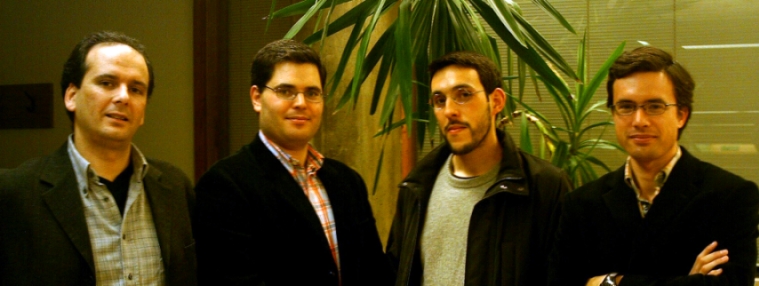grep Neoscopio FOSSBiz
Meet NeoscopioI interviewed the team at Neoscopio, a company that offers a suite of customized libre software solutions that help businesses take advantage of current software offerings, especially where those offerings may fall short in some way. MA: Andrade, Miguel (CEO)
GM: Neoscopio was born as a spin-off of University of Porto (Portugal) and is now in startup phase. It is already providing products and services to a few representative clients (who actively sought our services), although it is focused on seeking venture capital in order to follow it's rapid growth strategy. DiscussionHow long have you been in business? MA: I (personally) have been in business working as an independent Open Source software consultant since 2003. Neoscopio, as GM said above, is a start up, still waiting for Investors, but we have already started working, since April 2006. What geographical territory do you cover (i.e., Southeastern US, West Africa, global, etc.)? MA: Right now, we cover our country, Portugal, but we aim to be a Full European company How many employees do you have? MA:Four (Management) at this moment. In our business plan we plan 10 people first year, at the end of the first year and 25 at the second. What kind of background do your team members have? How will this background help your business succeed? MA:We are from different backgrounds: I'm from Engineering (Computers and Telecommunications) with a MBA in Operational Research, GM from Psychology and now starting is MBA in Management, MC from Theoretical and Computational Physics and NC is from Theoretical and Computational Chemistry, all of them working towards PhD's in their respective fields. We definitely feel that our different backgrounds have a wide contribution to our views as a company. We feel an OS company must reach as many different areas as possible. Given our research background every one on the team felt in the past the need for software tools and ended up using OS. This gave us knowledge about OS and it's advantages over commercial software, mostly because in doing research, there's a latent need for changing the code in numerous situations. Price is always a strong issue too. After this, the need for support and technical assistance was evident. The market opportunity was felt here first. There´s a need for support, assistance and warranties in the OS. Of course you can always do it yourself or turn to the community, but there are a lot of situations you would be better contracting support and warranties. What kind of sales revenue are you generating? MA:Right now we are looking at 20K€ by the end of this year. This may not seem much, but keep in mind that the company will only start working full time next year. We still maintain our regular occupations. You offer custom implementations of libre projects. How are your custom implementations licensed? MA:We stick to original license, mostly GPL. If we develop a module or some custom piece of code we chose GPL also, and give it back to the community. We do not have "professional" or other non-libre versions, we think that this kind of approach is ultimately harmful, since it leads to smaller communities around the projects, and it really makes a solution "closed". I don't see a way to download your software. How do customers get up and running with NeoWorking, or your other custom software implementations? MA:Any of our implementations is a custom implementation. E.g. Right now NeoContent can be an customized implementation of Drupal or Plone. NeoWorking can be a custom implementation of e-groupware, Tutos, or Open GroupWare. We don't fork the original products. For each client needs we choose an OS application we master, and that we think it's best suited, and custom it for the client needs. This is an important side of our business view. We don't offer every OS solution possible. We concentrate in a few. Of course, if there's a need for a different solution we can be hired to go and seek an OS solution that solves that particular need. Afterwords if we feel there's a market for it we can promote it as a product. This was the path that lead to NeoGest, a franchise chain management software, that integrates a accounting software (WebERP) for master franchise and POS software (TinaPOS) for stores. Tell me a little bit about your services. GM: Our main services are NeoDevel, NeoSupport and NeoBetter. NeoDevel is about the development of customized solutions (by client request), NeoSupport is about giving support to open source software products (by e-mail, phone or on-site) and with NeoBetter we aid companies' adoption of Open Source products by training them to use those products. We also offer general consulting on Open Source. What are you launching next, and when? MC: We are very excited with people coming to us with requests on high performance computing, so we are preparing to launch a new product, Neowulf, which will consist on personalized, optimized, complete package solutions for scientific computing, as well as related services and consulting, which we are already doing. Of course, this will require the best hardware available, and we are looking for partners capable of delivering this end of the deal. Given our backgrounds, we feel that we are in a unique position to serve this segment. GM: We are also launching a new product, NeoAsking, based on PHPSurveyor, which allows customers to create and manage questionnaires (both on paper and on-line). This product is capturing the interest of public institutions (as universities) worried about collecting the students' opinions about their services (quality assessment) and from business in general, as the web is becoming much more interactive and is now a good way to get customers and collaborators feedback, or to promote generic surveys. What kind of customers do you serve primarily – businesses, individuals, educational, non-profits? MA:Right now business and educational, and defined in our business plan, we aim at government and large institutions also. Can you give me an example of how you have helped a customer (either with services or software)? MA: Our first customer was really unhappy with their web presence. They plan to do a lot of functionality for their associates, and start looking at custom web programming, which they found too expensive. Casually I mentioned to their director that we were starting a software company and that one of our starting products would be a content management system. She asked for a quote, and bought us our first NeoContent solution, along with hosting and support for a fraction of their best quote yet and with more functionality than any other. MC: One of our first customers came to us unsatisfied with a popular Portuguese (commercial) business management software, Sage linha 60, which we replaced by an integration of TinaPOS and WebERP, specifically tailored to their needs - in particular, he was able to distribute the point of sale to his franchisees and manage all stock and orders from the ERP. Is business dropping, increasing, or fluctuating? MA: Definitely increasing. We didn't start formal promotion, because we want to be sure we are able to respond positively and successfully to new customers. To do this, we need all company formalities in place. But some how new clients find us and hire us despite we are still starting the company. We are responding well until now, but we are moving fast to our operational limit. Company formalities are only expected by the end of this year, mostly due to VC matters. Afterward we expect business to increase even more, because we already know where most of our future clients are, and if this trend continues, unknown clients will find us after some marketing effort. What is the most common challenge you run up against? MA: Explaining OS concept. Not for our clients (price and fast deployment seems to be good enough), but for people that can bring us clients. We developed a large rhetorical baggage on OS, and particular on our personal business view. We spend a lot of time advocating OS. For what at the time seemed like a lot of good reasons, we only look for venture capital in the Portuguese market. We had some success, but not quite what we expected. There's really no VC market in Portugal, although it seems to be starting. Looking for VC only in Portugal seems a mistake now because it is setting us back. GM: as MA was saying, a big challenge as been trying to find VC's interested in this business; we feel that there are still a lot of VC's who are afraid, thinking that OS will be the second "dotcom" bubble! There are lots of stereotypical descriptions of users who just can't use GNU/Linux. Do you see any particular stereotype being destroyed? Interview response goes here Interview response goes here Footnotes, Links, etc. |
|
| Subject | Topic Starter | Replies | Views | Last Post |
|---|---|---|---|---|
| Don... | Teron | 2 | 1,798 | Aug 28, 2006 7:23 AM |
You cannot post until you login.


